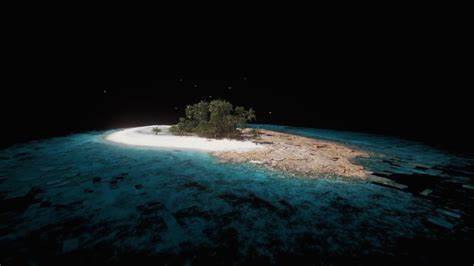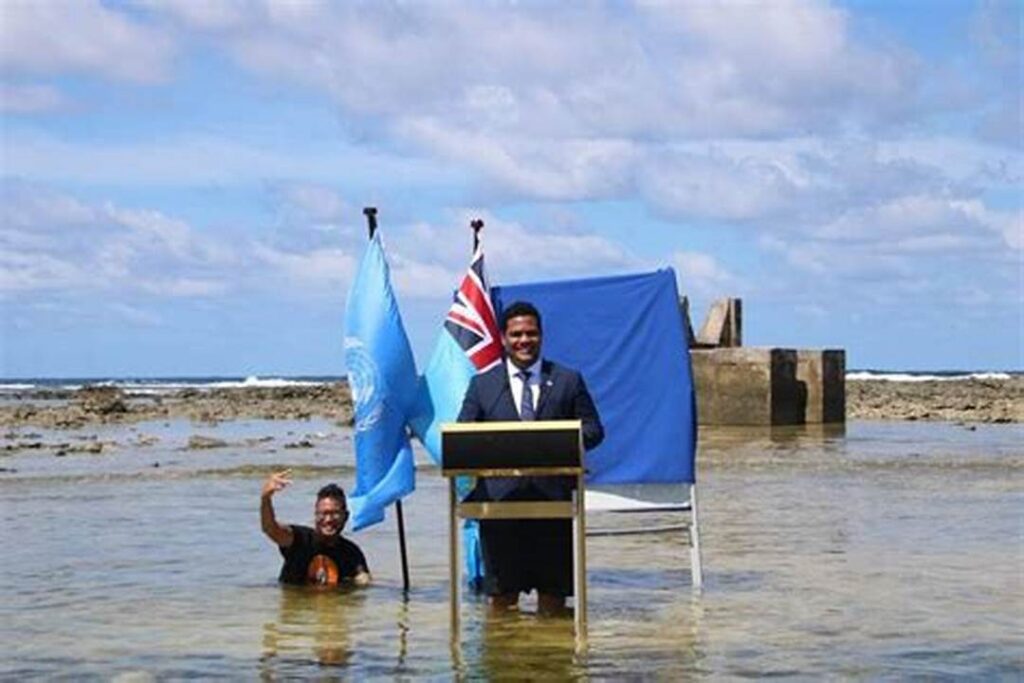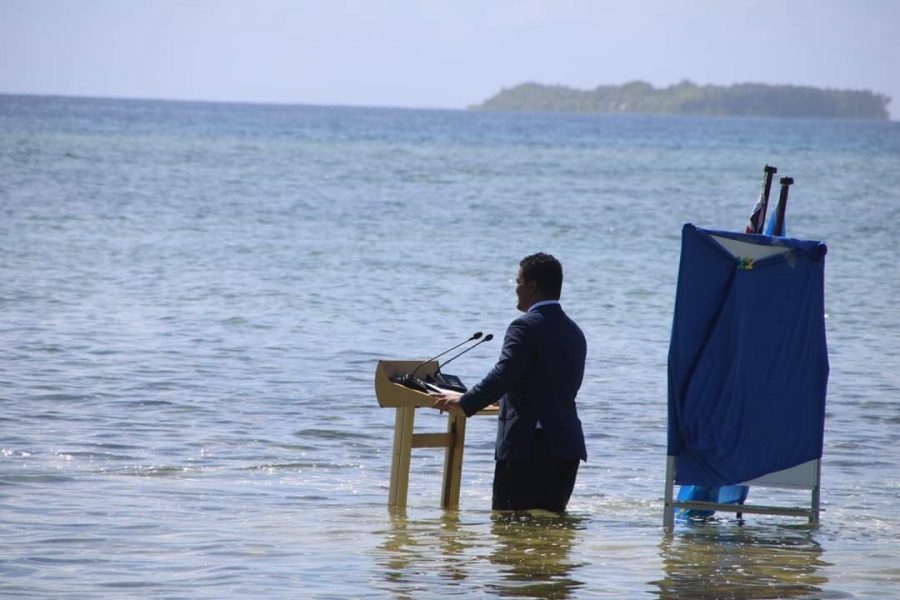By Eirini Tassi,
“Piece by piece, we will preserve our country, provide solace to our people, and remind our children and our grandchildren what our home once was.” (Simon Kofe, 2023)
Even though referring to the glass as half full is commonly associated with a positive view of life, in the case of the Polynesian nation of Tuvalu, that’s far from it. The dangerously rising sea levels that global warming has triggered have given the island state a fast-approaching expiration date. As foreign minister, Simon Kofe stated in June 2023, “as our land disappears, we have no choice but to become the world’s first digital nation. Islands like this won’t survive temperature increases, rising sea levels, or droughts, so we will recreate them virtually; we’ll move them to the cloud”. This means that present-day Tuvalu will be digitally reconstructed using satellite imagery, photos, and drone footage before its land completely succumbs to the ocean in the next few decades. Tuvaluans are already living through a climate dystopia: not only has sea rise infiltrated with crop plantations and fisheries, causing significant food insecurity, but it is already eating away coasts and islands, forcing people to relocate to the capital, Funafuti. This is just the beginning; tides are expected to flood 95% of Tuvalu by 2100, transforming the culturally rich island nation into a mere digital time capsule—the only way for the next generation of Tuvaluans to preserve a link with their customs and history.

This is significant considering the important role land plays in the culture of Tuvalu and other Pacific states. Islanders, land, and sea coexist in a symbiotic, sacred interconnectivity where one nourishes the other to secure their united existence. Humankind is not perceived as superior to nature; on the contrary, the earth and ocean are embraced by indigenous cultures as the untamable spiritual authorities that guide their way of life and connect them to the previous and future generations of islanders. Land is the past, the present, and the future, being home to our ancestors and a legacy that will be passed on to our grandchildren. This view of a “sacred ecology” is thus the basis from which Pacific Indigenous traditions, mythologies, and cultures proliferate; they explain humankind’s position in the vast cosmos and integrate nature’s sacred laws in everyday life to maintain this symbiotic, spiritual connection to it. Therefore, the unnatural, human-induced submersion of land in Tuvalu and other Pacific states signifies spiritual death; humankind that attacks nature instead of guarding it lives in disharmony with the earth and ocean, with their symbiosis under the norm of “sacred ecology” now becoming parasitical.
Losing land for Pacific islanders is thus not merely losing touch with a familiar physical environment but disconnecting from an intergenerational spiritual bond with nature. The natural environment births and sustains human civilizations, and so its systematic destruction by the capitalist core of global production is slowly turning these culturally rich Pacific nations into spiritually and culturally disoriented societies, merely reduced to their political and national sovereignty in the global human arena. “When you take an aboriginal from his land, you take him from the spirit that is giving him life” (Burger 1990).
In COP 26 back in 2021, the annual climate summit by member-states of the UN’s Framework Convention on Climate Change (UNFCCC), foreign minister Kofe joined online, standing knee-deep in the sinking shores of Tuvalu to highlight the urgency of climate mitigation for all Polynesian islands who are on the verge of complete disappearance.

Despite international coverage of his captivating visual position and statement, pragmatic solutions hardly came underway. Global decisions on climate change are either of a mitigating or an adaptive nature, the former including policies that would reduce human-induced global warming through decarbonisation and other measures, and the latter concerning solutions for how states can deal with the already existing ramifications of this climate destruction. Cop 27 in 2022 largely concentrated on adaptation measures, with large corporate and fossil-fuel polluters managing to conveniently emit the enforcement of stricter climate-mitigation commitments upon them. Tuvalu, Vanuatu, and other climate-vulnerable nations proposed a Fossil Fuel Non-Proliferation Treaty for transitioning to clean energy, yet were only given a moderate Loss-and-Damage Bill in the summit. This merely gave them monetary support for their climate-induced suffering, like subsidies for food security programs, climate-resistant infrastructure, and Tuvalu’s land digitisation.
While this does provide some substantial support, money cannot solve everything, especially when talking about ecological decline. Pouring money into fixing plummeting and insulation issues on a house with foundations prone to collapse will only solve maintenance matters temporarily. If the fragile ground is never addressed, these matters will re-emerge on larger scales as the house moves further into total collapse. In other words, it is irrational to pour money into compensation packages for climate-vulnerable nations while continuing to use the carbon-based production that created these vulnerabilities in the first place. As the climate Envoy for the Marshall Islands stated in response to last year’s compensation bill “we cannot adapt above 1.5 (here referring to the goal of keeping global warming under 1.5C in the 2015 Paris Agreement). Above 1.5 is just loss and damage and there is not enough money in the world to pay for the loss and damage that we would face above 1.5”. She is right. But nobody seems to listen besides fellow climate-vulnerable member-states. In Cop28 just last week, not only were climate-mitigation measures non-binding and suggestive but the “phasing out” of fossil fuels was completely removed from the summit’s last draft text after heavy pressure from petrostates. We are thus currently facing a loop of non-pragmatic adaptation measures vis-a-vis climate change, with no realistic capacity to tackle the disastrous eco-humanitarian repercussions it brings and will bring in the future. The second part of this article explores why this is the case.
References
- Burger, J. (1990). The Gaia Atlas of First People. London, BC: Gaia Books Ltd. “COP28: Draft deal slammed for dropping call to “phase out” fossil fuels”, Global News. Available here
- Dickie, R.A. (2005). “Indigenous Traditions and Sacred Ecology in the Pacific Islands”, UW-L Journal of Undergraduate Research VIII, 1-9.
- “Final day at COP28: What you need to know”, CNBC Television. Available here
- “Tuvalu minister to address Cop26 knee deep in water to highlight climate crisis and sea level rise”. Theguardian.com. Available here




